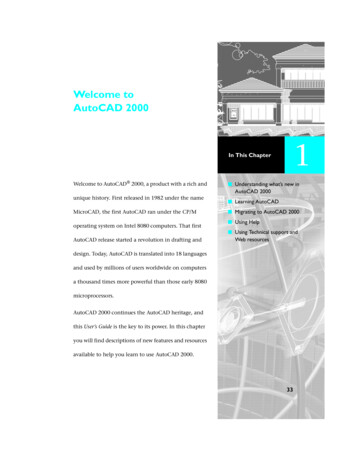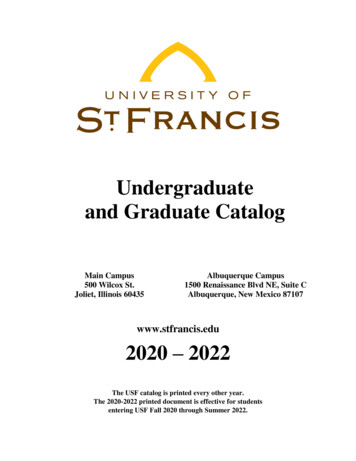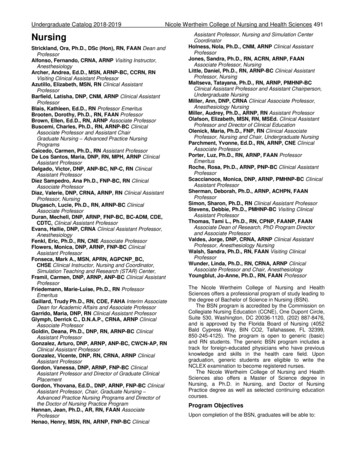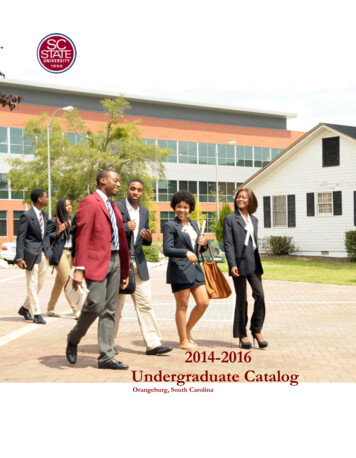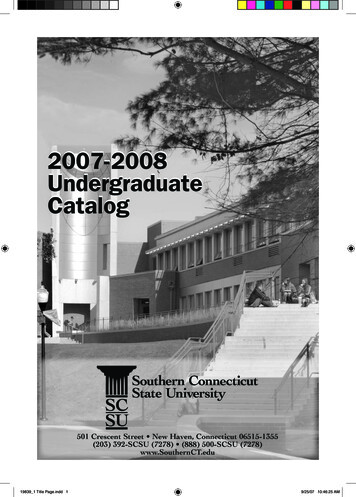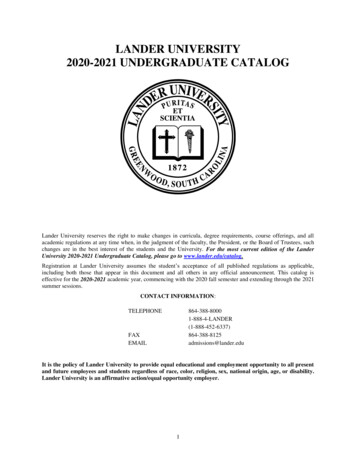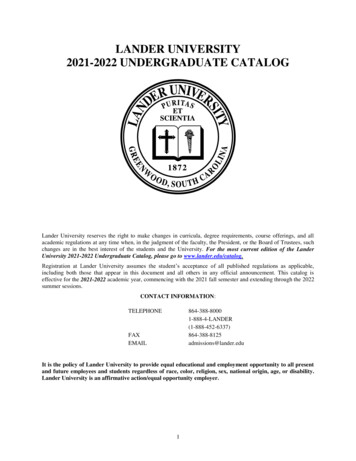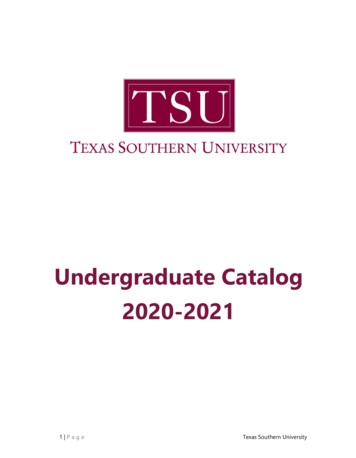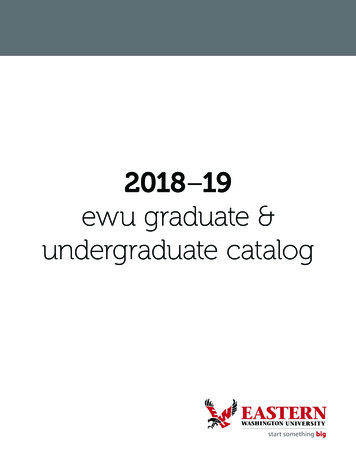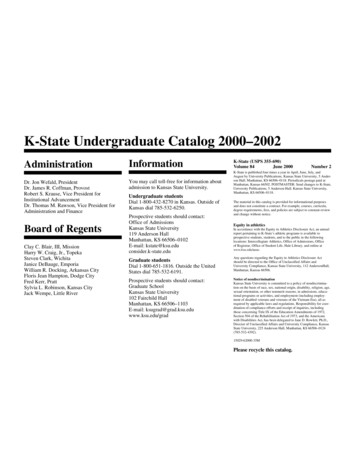
Transcription
K-State Undergraduate Catalog 2000–2002AdministrationDr. Jon Wefald, PresidentDr. James R. Coffman, ProvostRobert S. Krause, Vice President forInstitutional AdvancementDr. Thomas M. Rawson, Vice President forAdministration and FinanceBoard of RegentsClay C. Blair, III, MissionHarry W. Craig, Jr., TopekaSteven Clark, WichitaJanice DeBauge, EmporiaWilliam R. Docking, Arkansas CityFloris Jean Hampton, Dodge CityFred Kerr, PrattSylvia L. Robinson, Kansas CityJack Wempe, Little RiverInformationYou may call toll-free for information aboutadmission to Kansas State University.Undergraduate studentsDial 1-800-432-8270 in Kansas. Outside ofKansas dial 785-532-6250.Prospective students should contact:Office of AdmissionsKansas State University119 Anderson HallManhattan, KS 66506–0102E-mail: kstate@ksu.educonsider.k-state.eduK-State (USPS 355-690)Volume 84June 2000Number 2K-State is published four times a year in April, June, July, andAugust by University Publications, Kansas State University, 5 Anderson Hall, Manhattan, KS 66506–0118. Periodicals postage paid atManhattan, Kansas 66502. POSTMASTER: Send changes to K-State,University Publications, 5 Anderson Hall, Kansas State University,Manhattan, KS 66506–0118.The material in this catalog is provided for informational purposesand does not constitute a contract. For example, courses, curricula,degree requirements, fees, and policies are subject to constant reviewand change without notice.Equity in athleticsIn accordance with the Equity in Athletics Disclosure Act, an annualreport pertaining to K-State’s athletic programs is available toprospective students, students, and to the public in the followinglocations: Intercollegiate Athletics, Office of Admissions, Officeof Registrar, Office of Student Life, Hale Library, and online atwww.ksu.edu/uauc.Graduate studentsDial 1-800-651-1816. Outside the UnitedStates dial 785-532-6191.Any questions regarding the Equity in Athletics Disclosure Actshould be directed to the Office of Unclassified Affairs andUniversity Compliance, Kansas State University, 112 AndersonHall,Manhattan, Kansas 66506.Prospective students should contact:Graduate SchoolKansas State University102 Fairchild HallManhattan, KS 66506–1103E-mail: ksugrad@grad.ksu.eduwww.ksu.edu/gradNotice of nondiscriminationKansas State University is committed to a policy of nondiscrimination on the basis of race, sex, national origin, disability, religion, age,sexual orientation, or other nonmerit reasons, in admissions, educational programs or activities, and employment (including employment of disabled veterans and veterans of the Vietnam Era), all asrequired by applicable laws and regulations. Responsibility for coordination of compliance efforts and receipt of inquiries, includingthose concerning Title IX of the Education Amendments of 1972,Section 504 of the Rehabilitation Act of 1973, and the Americanswith Disabilities Act, has been delegated to Jane D. Rowlett, Ph.D.,Director of Unclassified Affairs and University Compliance, KansasState University, 225 Anderson Hall, Manhattan, KS 66506–0124(785-532-4392).15029-62000-35MPlease recycle this catalog.
2 ContentsContents3About the Catalog42 International Programs4About the University5Calendar44444446464748497Glossary and Abbreviations8Admission12Academic Advising14Enrollment16Tuition and Fees22Degrees25Grades28All-University Regulations31Student Financial 3737383838Services for StudentsAcademic Assistance CenterAcademic and Career Information CenterAdult Student ServicesAlcohol and Other Drug Education ServiceCareer and Employment ServicesCooperative HousesDisabled Student ServicesEducational Supportive ServicesGreek AffairsHousing and Dining ServicesInternational Student CenterK-State Student UnionLafene Health CenterMulticultural Student OrganizationsNew Student ServicesOff-Campus HousingOffice of Student LifeRecreational ServicesReligious AffairsStudent ActivitiesStudent GovernmentUniversity Counseling ServicesUpward BoundWomen’s y Services and FacilitiesAffirmative ActionAlumni AssociationChild CareComputing and Network ServicesFamily CenterFoundationIDEA CenterInformation SystemsInstitutional AdvancementLibrariesPolice DepartmentPostal ServiceSpeech and Hearing CenterStudent PublicationsTelecommunications ServicesUniversity Press of KansasUniversity RelationsSecondary MajorsAmerican Ethnic StudiesGerontologyIndustrial and Labor RelationsInternational StudiesLatin American StudiesNatural Resources and Environmental StudiesWomen’s ural EconomicsAgricultural EducationAgricultural Technology ManagementAgronomyAnimal Sciences and IndustryCommunicationsEntomologyFood Science and IndustryGeneral AgricultureGrain Science and IndustryHorticulture, Forestry, andRecreation Resources76 Plant Pathology7879798284Architecture, Planning, and DesignEnvironmental Design StudiesArchitectureInterior ArchitectureLandscape Architecture and Regional andCommunity Planning88 Arts and Sciences92 University Undergraduate Studies:Interdisciplinary Majors93 Pre-Law94 Pre-Health Professions Programs96 Aerospace Studies97 Art99 Biochemistry101 Biology103 Chemistry105 Economics107 English109 Geography111 Geology113 History116 Journalism and Mass Communications119 Kinesiology121 Mathematics123 Military Science124 Modern Languages128 Music133 Philosophy135 Physics137 Political Science139 Psychology141 Sociology, Anthropology, and Social Work146 Speech Communication, Theatre, and Dance151 Statistics153155155157157159Business AdministrationAccountingFinanceGeneral 3174174177EducationTeacher EducationElementary Education ProgramSecondary Education ProgramTeaching Fields, Optional Certifications,and Other ProgramsCounseling and Educational PsychologyEducational Administration and LeadershipElementary EducationFoundations and Adult EducationSecondary EducationSpecial Education178 Engineering185 General Engineering186 Architectural Engineering/ConstructionScience and Management190 Biological and Agricultural Engineering192 Chemical Engineering194 Civil Engineering196 Computer and Information Sciences199 Electrical and Computer Engineering202 Industrial and Manufacturing SystemsEngineering205 Mechanical and Nuclear Engineering208210214219223Human EcologyApparel, Textiles, and Interior DesignFamily Studies and Human ServicesGeneral Human EcologyHotel, Restaurant, Institution Managementand Dietetics224 Human Nutrition227227230234Technology and AviationArts, Sciences, and BusinessAviationEngineering Technology244245245245Veterinary MedicineAnatomy and PhysiologyClinical SciencesDiagnostic Medicine/Pathobiology246 Graduate School247 Intercollegiate Athletics248 K-State Research and Extension252252252253OutreachDivision of Continuing EducationInternational AgricultureKansas Regents EducationalCommunications Center254 Faculty
About the Catalog 3About the CatalogThe K-State Undergraduate Catalog is a reference for those interested in academic policies, procedures, and programs of the university. Refer to the table of contents or the indexfor specific topics of interest.Degree requirements and programs are organized by colleges and departments. Coursedescriptions are provided to help you and youracademic advisor plan your academic choices.Course DescriptionsThe following course description key explainsthe system used for courses listed throughoutthe catalog.Sample course description GEOG 221. Environmental Geography II. (4) II.A basic physical geography course emphasizing the geosphere and hydrosphere, including processes, patterns, andphysical background for related issues such as natural hazards and human modification of physical conditions. Introduces remote sensing and the use of topographic maps inenvironmental study. Three hours lec. and one two-hour labper week. Pr.: Environmental Geography I.The diamond ( ) indicates the course hasbeen approved for university general education program credit.The letters GEOG denote the departmentin which the course is offered (in this case,Geography).The three digits of the course number221 represent the level of the course.Course number system:000–099 Not applicable toward degree requirements.100–299 Lower division undergraduate. Designed asfreshman or sophomore course.300–499 Upper division undergraduate. Designed asjunior or senior course.500–699 Upper division undergraduate. Primarily for ajunior or senior, but also may be taken for graduate credit. A course numbered 500 may betaken for graduate credit only in a graduate student’s minor field. A course numbered 600 maybe taken for credit in a graduate student’s majorfield.700–799 Graduate and upper division, primarily for graduate level.800–899 Graduate level for master’s course or professional course beyond the undergraduate level.900–999 Graduate level, primarily for doctoral candidate.The number in parentheses (4) following thecourse title indicates the units of credit givenfor the course.Other PublicationsThe I, II, S, and/or intersession followingthe course title indicate the semester, orsemesters, each course is usually offered;I stands for fall semester, II for spring, S forsummer semester, and intersession for theterm between semesters.Other K-State publications are available onrequest from the offices listed below.The abbreviation Pr. indicates prerequisitesfor the course. In the sample course, studentswould be required to have completedEnvironmental Geography I before enrolling.Some courses may allow or require concurrentenrollment in other courses. This is indicatedby the abbreviation Conc.Faculty Lists KeyIn the departmental sections, faculty membersare listed by their last names. Those on thegraduate faculty have an asterisk followingtheir names.An all-inclusive faculty and administrationsection precedes the index. This section listseach faculty member’s full name, academicdegrees, and year of first appointment atK-State (in parentheses). Those on the graduate faculty have an asterisk following theirnames.Course schedule bookletThe Course Schedule, a listing of coursesoffered each semester, is available in thefollowing places: World Wide Webwww.ksu.edu/courses K-State Student Union BookstoreK-State Student Union, First Floor785-532-6583For prospective studentsOffice of Admissions119 Anderson Hall, dmissions Guide: Overview of majors andstudent life.For prospectivegraduate studentsGraduate School103 Fairchild Hall, 785-532-6191 or1-800-651-1816www.ksu.edu/gradContactsGraduate Studies: Overview of K-State’sgraduate programs and representative researchopportunities.www.ksu.edu/gradAll phone numbers are 785 area code, exceptwhere noted. All addresses are Manhattan,Kansas, 66506, except where noted.Graduate Catalog: Descriptions of graduateprograms and courses.www.ksu.edu/gradOnline CatalogThis catalog is available atwww.ksu.edu/courses on the web.Graduate Handbook: Presentation of university policies on graduate education adopted bythe Graduate Council on behalf of theGraduate faculty.www.ksu.edu/gradFor continuing educationDivision of Continuing EducationCollege Court Building, 785-532-5687www.dce.ksu.eduDistance Education Catalog: Listing ofcourses—offered through a variety of deliverymethods—that can be taken in your owncommunity.www.dce.ksu.edu/dce/distanceSummer Brochure for Teachers: Listing ofcourses of interest to educators. Availableeach April.
4 About the UniversityAbout the UniversityKansas State UniversityThe university was founded February 16,1863, established under the Morrill Act, bywhich land-grant colleges came into being.At first the university was located on thegrounds of the old Bluemont Central College,chartered in 1858, but in 1875 most of thework of the university was moved to the present site.The 664-acre campus is in northernManhattan, convenient to both business andresidential districts. Under an enactment ofthe 1991 Kansas Legislature, the Salina campus was established through a merger of theformer Kansas College of Technology withthe university.Additional university sites include18,000 acres in the four branch locations ofthe Agricultural Experiment Station—Hays,Garden City, Colby, and Parsons—and8,600 acres in the Konza Research Prairiejointly operated by the AES and the Divisionof Biology.One of the six universities governed bythe Kansas Board of Regents, Kansas StateUniversity continues to fulfill its historic educational mission in teaching, research, andpublic service.Mission statementKansas State University is a comprehensive,research, land-grant institution first servingstudents and the people of Kansas, and alsothe nation and the world.Since its founding in 1863, the university hasevolved into a modern institution of highereducation, committed to quality programs,and responsive to a rapidly changing worldand the aspirations of an increasingly diversesociety. Together with other major comprehensive universities, Kansas State Universityshares responsibilities for developing humanpotential, expanding knowledge, enrichingcultural expression, and extending its expertise to individuals, business, education, andgovernment. These responsibilities areaddressed through an array of undergraduateand graduate degree programs, research andcreative activities, and outreach and publicservice programs. In addition, its land-grantmandate, based on federal and state legislation, establishes a focus to its instructional,research, and extension activities that isunique among the Regents institutions.Through quality teaching, the university iscommitted to provide all students with opportunities to develop the knowledge, understanding, and skills characteristic of an educated person. It is also pledged to prepare students for successful employment or advancedstudies through a variety of disciplinary andprofessional degree programs. To meet theseintentions, the institution dedicates itself toproviding academic and extracurricular learning experiences that promote and value bothexcellence and cultural diversity. KansasState University prepares its students to beinformed, productive, and responsible citizenswho participate actively in advancing cultural,educational, economic, scientific, and sociopolitical undertakings.Research and other creative endeavors comprise an essential component of Kansas StateUniversity’s mission. All faculty memberscontribute to the discovery and disseminationof new knowledge. These efforts, supportedby public and private resources, are conductedin an atmosphere of open inquiry and academic freedom. Basic to the pursuit of thismission is the university’s commitment tobroad-based programs in graduate educationat both the master’s and doctoral levels.Kansas State University’s mission includesenriching the lives of the citizens of Kansasby extending to them opportunities to engagein life-long learning and to benefit from theresults of research. The university addressesthis charge through mutually supportive activities on its Manhattan and Salina campuses,research and extension sites at numerous locations, outreach programs offered throughoutthe state and nation, and internationalactivities.Distinguished Graduate Faculty Members arepresented at commencement. The universityalso honors faculty members who contributeto the expansion of knowledge in their respective fields.The faculty assume a major responsibility toparticipate in outreach activities that serve thecitizens of the state, and many hold leadershippositions in their disciplines and in professional organizations.Objective of theeducational programThe objective of the educational program atKansas State University is to develop individuals capable of applying enlightened judgment in their professional, personal, and sociallives.To that end the university program isdesigned:I. To provide full and efficient counseling andguidance to students at the university. Specifically, this means to:A. Learn and make known to students all thatis possible and useful about their interests,aptitudes, and abilities.B. Apply that knowledge to the students’choice of courses and curricula as fully aspossible without encroaching harmfullyon their initiative and feeling of selfresponsibility.The mission of Kansas State University isenhanced by symbiotic relationships amongthe discovery of knowledge, the educationof undergraduate and graduate students, andimprovement in the quality of life throughresearch applications. Coordinated teaching,research, and extension services help developthe highly skilled and educated work forcenecessary to the economic well-being ofKansas, the nation, and the internationalcommunity.II. To prepare students for an occupation or aprofession which includes an organized bodyof information and theory so they may realizetheir creative potential. More specifically thismeans that students should acquire:AccreditationB. The knowledge basic to their special fieldsof study.C. Provide continuing guidance for studentsaccording to their needs.A. The ability to recognize and masterfundamental principles in their fields ofspecialization.Kansas State University is fully accreditedby the Commission on Institutions of HigherEducation of the North Central AccreditingAssociation and by various professionalaccrediting agencies. Credit earned at K-Stateis transferable to other institutions.D. The basic skills associated with their fieldsof study.FacultyE. A professional attitude in their chosenwork.The faculty at Kansas State University arededicated to excellence in teaching, studentadvising, research, extension education, scholarly achievement, and creative endeavor.K-State recognizes superior teaching withannual faculty awards. Citations for theOutstanding Teachers of the Year and forC. The ability to reason critically from factsand recognized assumptions to useful technical conclusions.III. To provide all students with an opportunity to gain the knowledge and abilities members of a democratic society need, whateveroccupation or profession they expect to enter.Specifically, this means that through its program the university undertakes to help thestudent:
Calendar A. Develop communication skills.B. Develop the ability to apply critical andcreative thinking to the solution of theoreticaland practical problems.C. Understand the basic concepts of the natural sciences, the interrelations of the naturaland social sciences, and the impact of scienceon society.D. Comprehend and evaluate the processesand institutions in society at home and abroad,and develop a dynamic sense of personalresponsibility as effective citizens in a democratic society.E. Develop habits of self-evaluation, responsibility, and enterprise that will increase theeffectiveness of the educative process incollege, and provide the basis for continuedself-improvement.F. Develop a well-adjusted personality, goodcharacter traits, and a sound philosophy oflife.G. Prepare for effective participation in family life.H. Utilize actively and fully the capacity foraesthetic appreciation and enjoyment.IV. To stimulate the faculty and students toextend the boundaries of knowledge throughcritical and creative thinking and experimentation.V. To provide the facilities for extending education outside the boundaries of the campus tothe members of the community that the institution serves.CalendarAdditional academic dates and deadlines canbe found at mic on theWorld Wide Web.May 2001IntersessionFall Semester 2000May 14–June 1, Monday–FridayIntersession.August 21, MondaySemester begins.September 4, MondayUniversity holiday.October 20, FridayStudent holiday.November 22–24, Wednesday–FridayStudent holiday.November 23–24, Thursday–FridayUniversity holiday.December 8, FridayLast day of semester.December 8–9, Friday–SaturdayCommencement.
admission to Kansas State University. Undergraduate students Dial 1-800-432-8270 in Kansas. Outside of Kansas dial 785-532-6250. Prospective students should contact: Office of Admissions Kansas State University 119 Anderson Hall Manhattan, KS 66506–0102 E-mail: kstate@ksu.edu consider.k-state.edu
